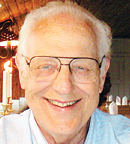
Richmond T. Prehn, MD
Until 1957, the prevailing thought was that since cancers develop in normal patients, they are not recognized as foreign by the immune system. That changed when Richmond T. Prehn, MD, and his laboratory assistant, Joan Main, showed that tumors induced by chemical carcinogens in mice could stimulate tumor-specific responses that were able to reject those same tumors on challenge. It was a paradigm shift in science, ultimately leading to the current boom in cancer immunology.
Dr. Prehn died at his home in Seattle on November 7, 2016. He was 93 years old.
Career Foundation
Shortly after completing a general internship at the Philadelphia Naval Hospital, Dr. Prehn joined the laboratory of Howard B. Andervont, MD, at the National Cancer Institute (NCI) in Bethesda, Maryland. Early during Dr. Prehn’s tenure, he accepted a commission in the U.S. Public Health Service and established his own independent laboratory at the NCI. During this period, he developed an interest in the possibility of immunity in relation to cancer in mice, although this line of inquiry was highly disputed at the time.
In 1955, Dr. Prehn received a request to discuss his work with NCI Director John R. Heller, Jr, MD. “After learning of my work, Dr. Heller, advised me, in no uncertain terms, to find some other interest with better prospects,” Dr. Prehn said in an interview.
Undaunted, he left the NCI in 1956 and began a residency in pathology at the Public Health Service hospital in Seattle. However, the experiments he had done at the NCI proved successful, culminating in his groundbreaking 1957 paper with Ms. Main, “Immunity to Methylcholanthrene-Induced Sarcomas.”
On the basis of that paper, Dr. Prehn was offered an assistant professorship in pathology at the University of Washington in 1958. “While I have subsequently published extensively in the field of tumor immunology, that one paper was truly the foundation of my career,” noted Dr. Prehn.
Later Roles
Subsequently, he spent 10 years at the Institute for Cancer Research (which would eventually merge with the American Oncologic Hospital to become Fox Chase Cancer Center) in Philadelphia; 5 years as Director of the Jackson Laboratory in Bar Harbor, Maine; and 5 years as Director of the California Institute for Medical Research in San Jose. He then returned to the University of Washington, where he spent the rest of his career.
Dr. Prehn was a good man and fine colleague, but he was his own man, and he was fiercely independent.— W. Thomas London, MD
Tweet this quote
Dr. Prehn was a tireless researcher who always challenged scientific orthodoxy. Thus, he realized the limitations of his own work in immunology, arguing that an antitumor vaccine might never be effective, given the enormous variability among tumors and continued evolution of different cell populations within the same person. Dr. Prehn subsequently extended this work in another important, counterintuitive direction by suggesting that too much immunity might stimulate tumor growth.
Speaking with The ASCO Post, his former colleague at Fox Chase, W. Thomas London, MD, said, “Dr. Prehn was a good man and fine colleague, but he was his own man and he was fiercely independent. He had three loves in his life: his wife, Lisa Prehn, MD, who coauthored a number of his papers; sailing (for many years, he owned a Chinese junk that he sailed up and down both coasts); and his science.”
In addition to leaving his mark on the promising field of immunotherapy, Dr. Prehn was a teacher who inspired many future medical scientists. He is survived by his wife, four children, and five grandchildren. ■

